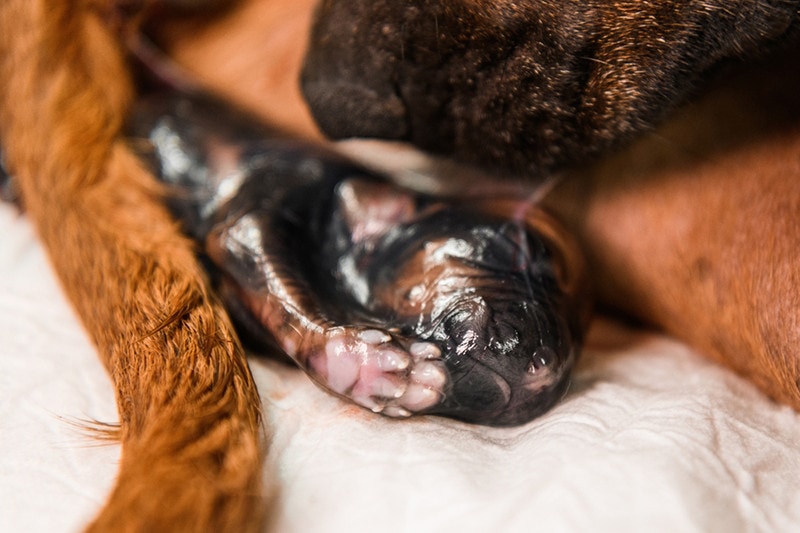How Long Do Dogs Bleed After Giving Birth? Our Vet Explains Facts & FAQ

Updated on

Click to Skip Ahead
If you are the proud owner of a brand-new canine family, you will be wanting to make sure you are staying on top of everything your dog and her pups need. Part of this is knowing what to expect before, during, and after whelping (giving birth), which includes being familiar with what is and isn’t normal.
It is quite normal for your dog to have some bleeding after birth, and this can last for up to 7 days. However, a lot of bleeding is a worrying sign, as are certain other types of postpartum discharge.
Keep reading to learn more about what sort of post-whelping bleeding is normal and when you should call your vet.
What Sort of Discharge Is Normal?
If your dog has already given birth, it is likely that you’re already familiar with the types of normal—and not so normal—discharge you may encounter leading up to the birth of puppies. If not, you can read a bit more about that here.
As you can imagine, it is perfectly normal for your dog to have some bleeding after they have given birth, particularly if they have delivered a lot of pups or very large pups. Dogs that have undergone a cesarean are also likely to have some bleeding, even if they were spayed at the same time.
In the first few days, you should expect to see some fresh-looking blood mixed with some clear or greenish fluid. How much is normal will depend on the size of your dog, but a couple of teaspoons worth in a small dog would be considered normal, as is 1–2 tablespoons from a larger breed.
Over the next few days, the blood should become darker, might contain clots, and be generally decreasing in the overall amount. By day seven, you should not be seeing much, if any, discharge at all. If this is not the case, it is time to call your vet.

Why Does My Dog Bleed After Giving Birth?
Unlike in humans where the baby is usually delivered first with the placenta coming out after, puppies are normally born still inside the placental sac, which the mother usually removes by chewing and licking. Each of those sacs was attached to the wall of the uterus, and when it is time to be born, those attachments break down, allowing the pups to be pushed toward the vaginal canal.
Even during a normal delivery, the detachment of the placentas can result in some bleeding, which will be expelled over the course of several days. If your dog has had a particularly difficult delivery (A.K.A. dystocia), there may be additional bleeding due to some damage to the cervix, vagina, or vulva.
Dogs that have gone into labor early or had a cesarean before the placentas detached naturally are more likely to have more bleeding. This is because the attachment hasn’t broken down gradually, so there is more trauma as the pups break away from the wall of the uterus.
Even if your dog was spayed at the same time as the cesarean, it is not unusual to still have some bleeding, even though the uterus has been removed. This should be resolved within 2–3 days.

When Should I Take My Dog to the Vet?
It is always a good idea for a new mother and her pups to have a health check with the vet about a week after birth, just to make sure that everyone is healthy. However, there are times when you should be making an appointment much sooner than that.
If Your Dog Is Losing a Lot of Blood:
Although bleeding after birth is normal, the blood should not be steadily flowing or pooling. If this is the case, you need to get to the vet urgently.
If Your Dog Is Lethargic:
It is not unusual for your dog to be a bit sleepy after giving birth, particularly if it has been a long or difficult delivery or if surgery was involved. However, if she continues to be quite sedated 24 hours after the delivery, you should contact your vet for advice.

If Your Dog Starts Producing Smelly, Black, or Brown Discharge:
This could be a sign of infection or retained placenta.
Final Thoughts
It is completely normal for your dog to bleed after giving birth, and this can last up to 7 days. If your dog is losing a lot of blood, you should contact your vet immediately. Look out for lethargy, unpleasant-looking or smelling discharge, or any other signs that things aren’t quite right. It is always better to be overly cautious and check with your vet than to wait and regret it.
Featured Image Credit: stockphoto mania, Shutterstock














